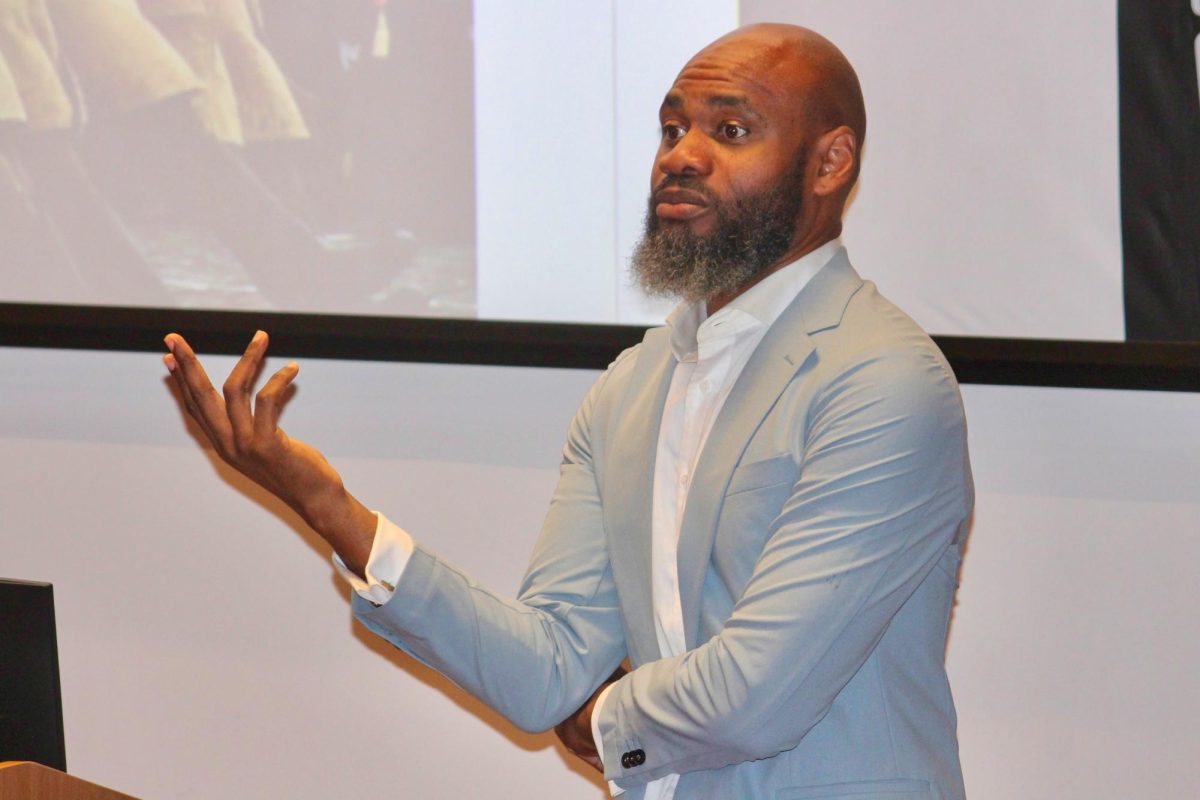On Wednesday, Sept. 18th, Grinnell’s Rosenfield Program, co-sponsored by the college’s Russian, Central European, and Eurasian Studies and the Chrystal Fund, hosted independent journalist Terrell Jermaine Starr.
Starr’s reporting primarily covers international and foreign affairs in Ukraine, which led the basis for his talk at Grinnell.
In his talk, Starr said he never envisioned himself reporting so extensively in Ukraine. His journey to Ukraine began in his junior year of college when he was given an opportunity to travel to Russia.
Starr said, “I wanted to do something abroad, volunteer abroad or something, and I found this program where, if you’re accepted, it pays for the trip … I chose all the Black places like Jamaica, like countries in Africa and all that other stuff. Then, when I got the acceptance notice, it said, ‘Welcome to Russia.’ I [didn’t] want to go to Russia.”
Despite his initial reluctance to live in Russia, with the encouragement of his grandmother, he ultimately chose to go. Starr said his time in Russia was isolating and challenging as a Black person, due to racism and a lack of shared worldviews in the surrounding community. Starr said, “The issue was, it was challenging just being a Black person.”
After traveling to Russia, Starr served for two years as a member of the Peace Corps in Georgia, beginning in 2003. He then pursued a joint Russian, East European, and Eurasian Studies and News-Editorial Journalism degree at the University of Illinois Urbana-Champaign in 2006. Through a Fulbright Grant, Starr traveled to and worked as a journalist in Ukraine in 2009, the country upon which most of his work has since focused.
“I went to graduate school and I wanted to learn about Black people in the Soviet Union. I didn’t want to go to Russia. I was like, ‘No.’ And then I went, then I said, ‘What was the second largest country in [the] USSR? Ukraine.’ That’s how it started … [In] 2009, I applied for a Fulbright to go to Ukraine, and that’s how it really began,” Starr said.
Starr’s talk at Grinnell covered his journey to Ukraine and his reporting on both the ongoing war and on the lives of Ukrainian people. He discussed how he utilized the few resources he had while reporting in Ukraine –– a media flak jacket, street smarts, his phone, a tripod and the protection of “Black Jesus.” Despite his limited resources, Starr said his approach offered a type of reporting that was more accessible and engaging to viewers.
Starr said, “[The phone] personalizes your engagement in a way that a camcorder or a Mark III Canon would not do. I noticed this distinction as I was going about my day, and then, it isn’t intimidating for people … I would just have these like common interactions, people kind of jump into the shot and it just gave me an opportunity to engage, because people respond more dimly to a larger camera than they do a phone, so I was able to weave and navigate faster.”
In reporting on the everyday lives of Ukranians during the war, Starr said he connected themes of adversity to his own identity as a Black man. Starr said his reporting is largely driven by the solidarity and empathy he holds for other historically oppressed communities as a result of the adversity he experiences due to his own racial background. In the context of Ukraine, Starr connects his own lived experiences with oppression to those faced by Ukranians.
“In my own way … I can relate to [the] Ukrainian … [the] person whose country was colonized, because we both were subjected to people in the office who decided to map out on the line where we all belong, what languages we would speak and how we would live,” said Starr.
Starr said that while he may not be Ukrainian, he does not need to be in order to respect and report thoughtfully on the country. Through his work, Starr seeks to draw people in as a community.
“I cover Ukraine the way I would cover my own communityI took pride in having the same type of passion for the Ukrainian people as I did my own, you don’t have to be Ukrainian to really care and treat these people with respect. You don’t have to be Black to treat Black people with the respect they deserve,” Starr said.
For college students, Starr gave a call to action––double major in foreign policy. Starr urged those in attendance to pay more attention to and engage in foreign policy discussions, regardless of their proximity to these issues.
Starr said, “I don’t care if you’re majoring in economics or if you want to be a historian or you want to be a doctor, we all, in our own personal and intellectual lives, need to double major in foreign policy … If you don’t participate in foreign policy discussions, foreign policy will inevitably engage you.”
As Starr looks to the future, he plans to continue to live and report in Ukraine and develop his YouTube channel @BlackDiplomatsOfficials, where he seeks to bring in voices of underrepresented people in Ukraine and Eastern Europe.
“I want to be able to cover Europe, perspectives of underrepresented voices, bring in a new audience of people, bring in more people of color, bring in underrepresented people who exist in these countries,” Starr said.
Starr’s visit to Grinnell represents his ongoing desire to continue sharing his experience reporting in Ukraine as well as continue to build communal support for other challenges in the larger world.
“My work is that we all jump in for each other. I’m just doing it for Ukraine, but it’s a map for everybody else,” Starr said.




















































